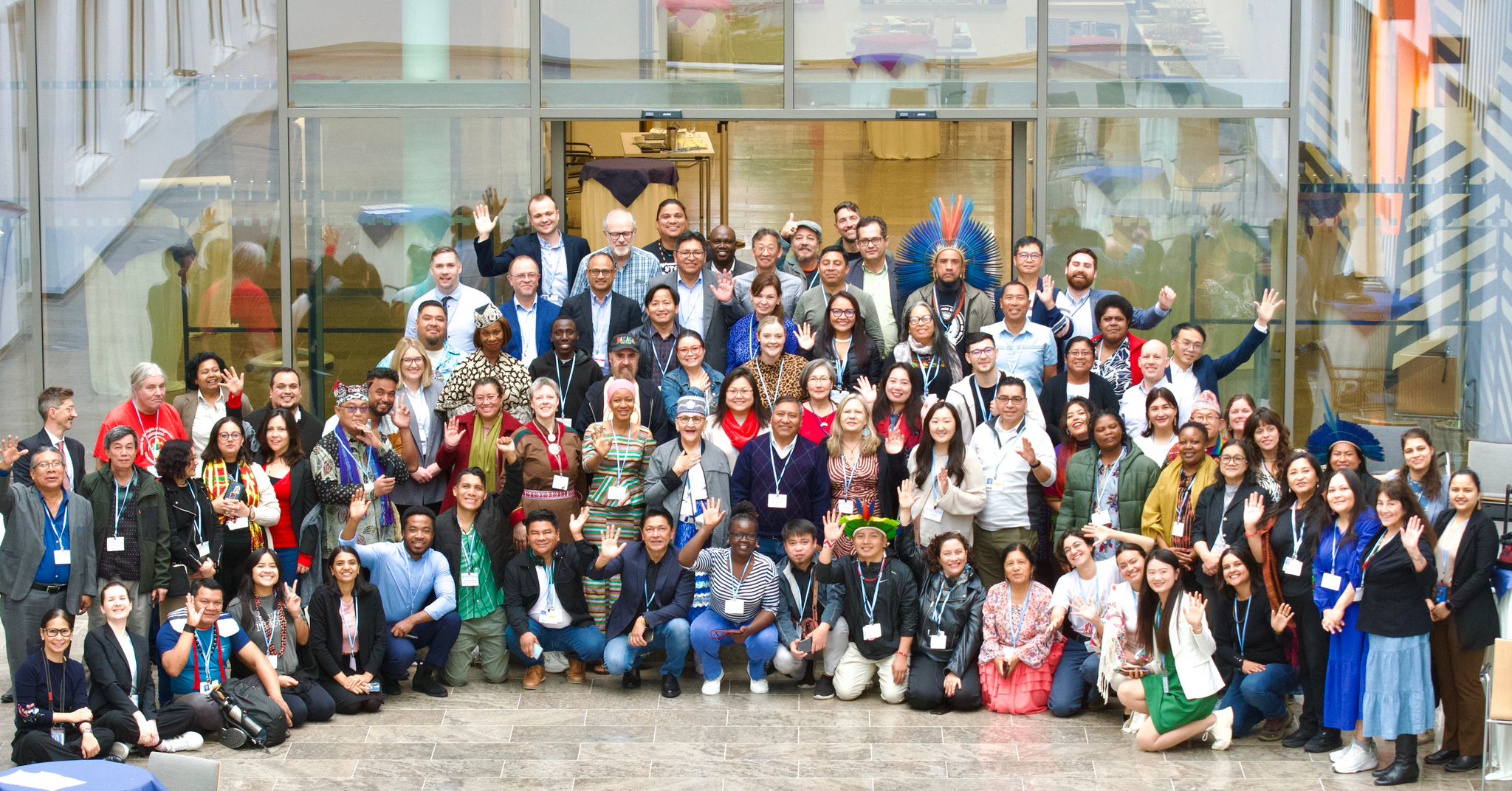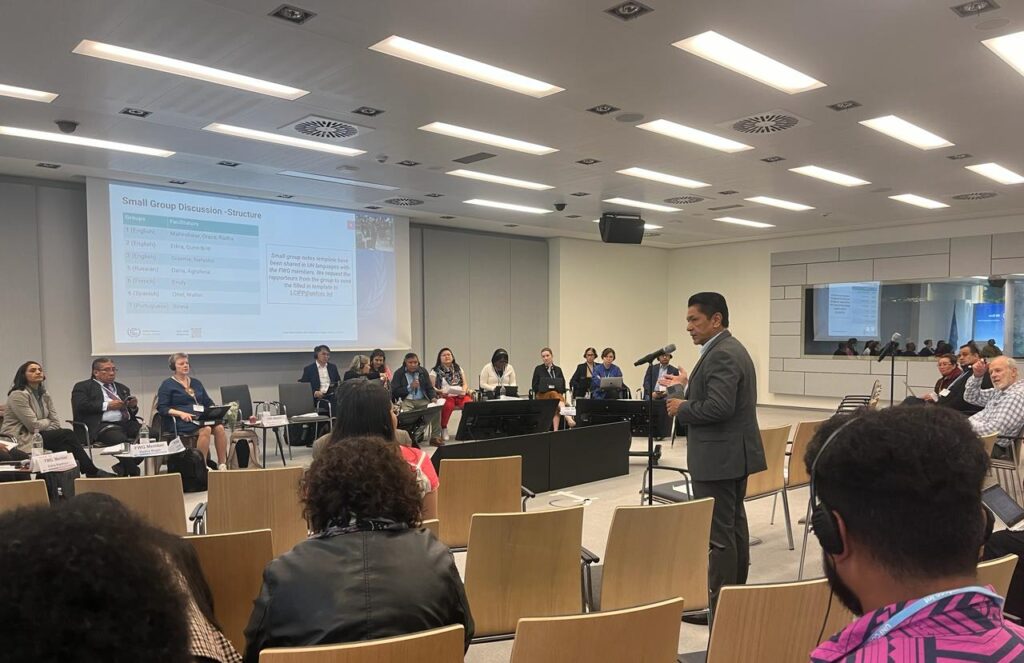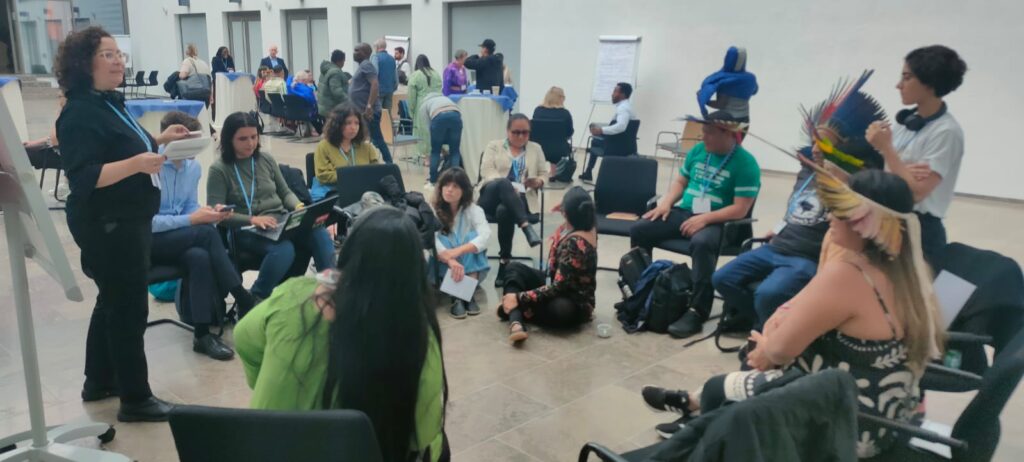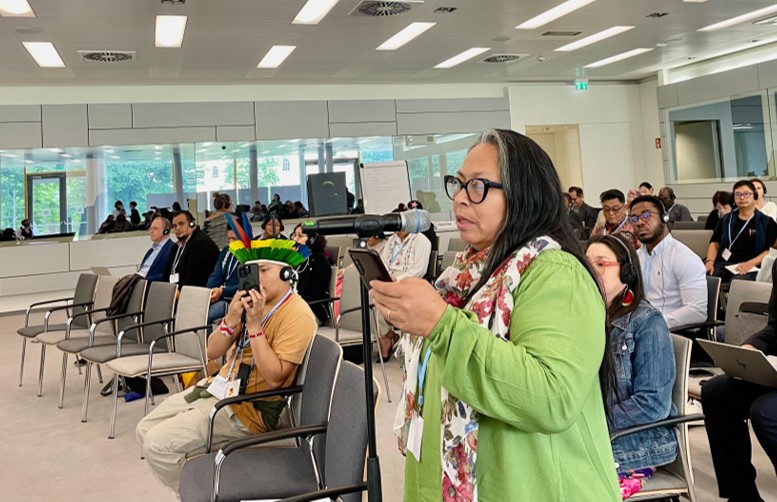Brazil extends the contributions of the Platform of Local Communities and Indigenous Peoples
The participation of local communities in the Convention on the Weather heats up this discussion in Germany on their way to the COP29, when you will have a decision on the matter. From manifesting itself.
By Andreas Fanzeres/OPAN

Bonn, Germany Between the 29th of may to 1st of June, 2024, took place in Bonn, Germany, on the 11th Meeting of the Working Group, the Facilitator (FWG) of the Platform of Local Communities and Indigenous Peoples (LCIPP) of the United Nations Framework Convention on Climate Change (UNFCCC). In the midst of the most predictable in the story, the participants left the meeting with a sense that the temperature is going up, when he returns to the communities in the area. In accordance with the decisions of the COP24 (Madrid) and the COP26 (Glasgow), it was determined that three of the chairs were to be taken over by the local communities, to the COP29, which will be held in Baku, Azerbaijan. But, up to now, the issue is treated as a taboo.
Even though they are listed in the name of the friend, of the Convention, set out in the Agreement in Paris, the participation of local communities, and this is a point of tension without resolution, because they are not able to put in the work. Up to the meeting last week, Gustavo Sanchez, president of the Alliance of Mesoamerican Peoples and Forests (AMPB), was a lone voice at the request of the subject matter to be at least discussed, in vain. At this time, with the support of other operations, mainly to Brazil, the dominican republic and asked for the floor on the first day of the meeting, requesting that it be entered on the docket of a point on the mechanism for the appointment of the representatives of the local community on a Platform, featuring an the letter signed by 20 organisations from the local community and more than 50 civil society organizations in Brazil, Mexico, chile, Guatemala, guyana, Honduras, Nicaragua, Costa Rica, Panama, Colombia, venezuela, and Germany, endorsed the request. “We believe that the inclusion of local communities in the Work Group, the Facilitator should not be put off, because it carries with it a situation of vulnerability, and no bill of rights. They were supposed to have a voice, it is crucial to address climate change and achieve the goals of the Agreement, in Paris, to create a world that is resilient to the weather, as outlined in the UN’s conference on climate change,” states the document, which was submitted to.

The reaction of the members of the order of inclusion of of this issue in the agenda has impressed some of the participants, because the point does not only do by being dropped, such as microphones, have been violently taken out of the plenary session, in order to avoid further assistance.
The current co-chair of the indigenous of the FWG was justified on the following day, which is the subject of the participation of local communities, and it is outside of the term of office of the members of the Platform. “We don’t want to be disrespectful, but it is not the responsibility of the FWG to determine the composition of the deck. This is a point of negotiation between the Parties, and that this is achieved without the participation of the indigenous peoples or local communities,” added Graeme Reed, who was the representative for the indigenous population of North America at the end of the meeting.
As explained in the plenary session of the 11th meeting of the FWG He Oliveira, executive secretary of the Forum, a Popular social and Environmental-of-state of Mato Grosso (From) the traditional communities that are recognized legally by the australian government from the policy of the country due to a history of struggle, and, thanks to the involvement in the development of public policies that support their way of life, their culture and their lands, and that they are setting an example to the world. “It seems to me that it lacked any empathy on the part of the members of the platform. I bid you farewell ‘ I hope that in a space like this in the UNFCCC, to be open to the discussion of this subject, and to consider the experiences and situations that we have in Brazil, and which, it seems, are aware of this group,” he said.
To Luene the Karipuna, a communicator of the Women’s Association of Indigenous peoples of the task force (AMIM), and the Coordination of the Indigenous Organizations of the Brazilian Amazon (Coiab), and the community is lacking right now on the Platform. “In Brazil, we have the clarity to those who are in the traditional communities, who are the indigenous peoples here, but this Platform is still a lack of it. By what I’ve seen, this is a question that causes a lot of noise and information in the country don’t understand how we came to understand in Brazil,” he says again.
Without formal recognition
As historiciza of the International Work Group on Indigenous Affairs (IWGIA) the Platform is the result of a process of construction, and the impact produced by the indigenous peoples, and the inclusion of the term in the local communities, it was something imposed upon by the Parties, in 2015, with no clarity as to the definition of the term, or who exactly pleiteava do that as well. Since the beginning of the FWG was divided equally, with up to seven seats for the representatives of indigenous peoples from each of the seven regions, socio-cultural, as well as seven of the government. But, the completion of at least three of the chairs by the site’s COP29 disrupt this balance, the first time in a copy of the UNFCCC.
Organizations that are representative of the indigenous peoples of the Arctic region, North America and Australia, have expressed their written consent to the Platform, the concern over the loss of parity between the members of indigenous peoples and the governments of the LCIPP, in the case of the inclusion of the local communities, since, in this case, they should be given the same number of countries in the post. The organisations in the Arctic, including, but pointed out that the subject should be re-discussed, when both the local community to form a Constituency. The term refers to the sub-categories within the group of non-governmental organizations, observers recognized by the Convention and the Climate, and to facilitate the exchange of information and contacts between the secretariat and civil society organisations with different interests. At present, there are nine of these sub-groups: Organizations, Businesses, and Industry (Bingo), Environmental Organizations (ENGO), Local Governments and Municipal Authorities (LGMA), Indigenous Peoples ‘ Organisations (IPO’s), Organizations, and Independent Research (London), trade Unions (Tungo), Female Gender (LAM) and Young (Youngo). According to the UNFCCC, an analysis is made of a claim for recognition of a Constituency to the farmers who operate on a temporary basis. The local communities are not listed in these groups.
By the middle of the requests made to the various organs of the United Nations, the International Forum of Indigenous Peoples on Climate Change (IIPFC) argues that the use of the term ‘ local communities with indigenous peoples, suggests that the other groups would want to mix in an equivalency of rights, which it views as a threat. According to the organization, the use of the term “local community” is sustained violations of human rights of the indigenous peoples, and it is recommended, among other things, the abolition of the use of the combined expressions that are not relevant to the particular nature of the indigenous peoples”, such as minority communities in the area. This position has been endorsed by the United Nations Permanent Forum on Indigenous Issues, by means of the Experts in the field of the Rights of Indigenous Peoples, the UN, and the Un Special Rapporteur on the Rights of Indigenous Peoples, in a joint statement published in February of this year.
The report on the review of the FWG
For the Conference in the Body, Contributing to the Advice of Science and technology (SBSTA) of the UNFCCC, the 3-on the 13th of June, the Working Group, the Facilitator of the Platform and will submit its report with the scope of the implementation process, in this instance, the difficulties, challenges, and recommendations, along with the new work plan for the LCIPP for the period from 2025 to 2027. After you have discussed and received by the SBSTA will be subject to the resolution of the Parties to the COP29 in Baku.
It cites, as a result of the efforts of the FWG to promote the exchange of ethical and equitable use of the knowledge of the solutions to the climate holistic between the indigenous peoples and local communities, and the pieces, and other workers; to improve the capacity of indigenous peoples, local communities and the Parties to achieve meaningful participation in the proceedings of the Convention, the integration of different perspectives, knowledge systems, values, and worldviews in the development and implementation of climate policies. It also notes the various challenges that hinder the full and effective participation of indigenous peoples and local communities in the process of the Convention, such as the need to incorporate the holistic approach of the solutions to climate change, to overcome language barriers, operational issues related to the transition of its members, among other things. The way in which the document is written out, keeping you in writing the words to the local communities, and to draw attention to this glaring contradiction, since none of these actions had on the actual involvement of these communities in the implementation of the action from the platform, until now.
However, with a tone of neutrality, the report of the SBSTA, reports that “the involvement of local communities in the work carried out in the LCIPP is still limited. The FWG has been struggling to fulfill its mandate, to continue moving forward in the implementation of LCIPP, and to facilitate the implementation of their tasks. In the absence of a universally accepted definition of “local communities”, it has become the the of their participation in challenging part in the various activities of the platform. In addition to this, the representation of local communities in the LCIPP will be considered in the review of the FWG”. And, in order to face this situation, he suggests that “to be explored ways to support the involvement of local communities in the work of the trading platform. This could include the development of specific activities aimed at increasing the involvement of local communities in the process of the UNFCCC in the framework of the implementation of the work of all the organs formed, and workflows that are relevant, based on the activities of the LCIPP”. The document refers to the holding of a workshop in Germany in 2019, and recommends that future efforts to increase the involvement of the local community, based on the orientations of the meeting.
The contributions of the brazilian delegation
Of the 14 members of the FWG and defined as 12 points in the routing, the consensus at the 11th meeting of the FWG. Between them, they found that there was a change in the co-presidents to act as a co-chair of the indigenous Platform, the Sra. Cathryn Eatock, Australia, and represents the Region’s socio-Cultural, Pacific, and Mr. Walter Gutierrez, who is representing the Regional Group for Latin America and the Caribbean (Grulac). His term ends at the 13th meeting of the FWG, the next year in Germany. Also, it was decided that the 12th meeting of the FWG will be held in Baku, Azerbaijan, from the 5th until the 8th of November, 2024.
The final document of the meeting notes that are to be incorporated into the understanding from discussions with small groups, in efforts to complete the implementation of the plan in 2022-2024, and also by providing a summary of these contributions. This is an important step forward for the Brazilian market, which has been getting to contribute, both orally and in writing at the same time, thus ensuring greater visibility for their technical contributions, thanks to the adoption of the methodology is to work in small groups.

Representing the delegation of Brazil, on the reports of the working groups, Sineia Leaves the Valley of the Indigenous Council of Roraima (CIR), and the national coordinator of the Indian Committee of the Climate Change conference (CIMC) has emphasized that it should be made of mechanisms and processes that are more transparent to ensure the full participation of indigenous peoples and local communities in the activities provided by the Platform, such as the meetings of the holders of knowledge and of the young people, without any proficiency in the English language to be a limiting factor. In addition, he suggested that they should be promoted to a meeting of the holders of the knowledge that is specific to the local communities, and the importance of moving forward on this issue, by considering the examples and the references to the legal adopted in Brazil.

Mauritius’kuana, the Hutukara Associação Yanomami (HAY) emphasized that the path to the resilience of the climate goes through the completion of all the processes and the demarcation of indigenous lands, and the territories of traditional communities. And yet, through the implementation of tools for the management of land. “We stress the importance of the recognition of the cultural, symbolic, spiritual and of a changing climate on the territory and the well-being of indigenous peoples and traditional communities. The impacts of these systems of knowledge, resulting in a reduction of the resilience of these people. To be culturally tailored and effective, and the methodologies that they need to respect the time of others in the context of policy development, and climate action,” he said.
Among other things, the position of the brazilian delegation, he is the innovation of the political climate in Brazil, the National Policy on land Management and Environmental Maroon (PGNTAQ) established in November of last year, and it brings with it, with the objective of territorial integrity of the territories of fugitive slaves “to carry out information and awareness-raising on the impact of the emergence of climate, the climate justice and environmental racism in the territories of descendants of runaway slaves, and in the surrounding area, and to promote the creation of a participatory systems for the diagnosis and monitoring of the impacts of the emergency, change in climate, with a view to developing strategies for prevention and mitigation and adaptation measures on the territories of the maroons”.
He also reiterates that, for the LCIPP, which is material in the Protocols of the consultation of Indigenous Peoples and Traditional Communities in Brazil, with the Plans of the Management of indian Lands, and the development Plans and the Plans of Indigenous Adaptation to Climate Change.
The delegation of Brazil suggested that, as the themes for the workshops and the annual training in the context of the LCIPP the inclusion of environmental racism in the discussion about a just transition; and the potential for the issue of the demarcation of indigenous lands, the Contributions of the Nationally Determined (NDC); and the safeguards to the indigenous peoples of the carbon market. It also recommended that the sessions with multiple stakeholders, carried out on the Platform, to adopt methodologies based on the Dialogue of the Talanoa to be the most effective. And the themes of loss and damage (including, the spiritual aspects and with direct access to climate finance for the youth of the indigenous, are to be given priority in the discussions on this forum.
In view of the Luene the Karipuna, it is a space which needs to be dominated by the indigenous peoples and traditional communities. “There is a great deal of difficulty of the access to this space through language, and by the fact that the dynamics of the activity to be a very busy and tiring. It is, however, the method is more important than that, we have to make recommendations to the COP / mop”. The Platform has helped me a lot to learn about all the discussions in this area, but for me, teaching as the people it focuses on public policies, Brazil, safeguards, and climate change, in my state, in the northern brazilian state of Amapá. For the past year I have been following the training of the Network for Cooperation in the Amazon (the car), and the preparations for the Dubai COP28), and is now here, so I ask,” says Luene. “People tend to believe that the cbd is where it is common to everything, but we noticed that you where everything is on one Platform, conference or SB [dos órgãos subsidiários da Convenção do Clima] in the Caucus of Indigenous, that is, a place where everything is built,” he said.
The delegation of Brazil for the 11th meeting of the FWG/LCIPP was formed by the Dinaman Tuxá, and Lais Brazil, from the Articulation of the Indigenous Peoples of Brazil (APIB), Sineia Leaves the Valley CIR/CIMC), Luene the Karipuna, representing the Association of native american Women at Work (AMIM), and the Coordination of the Indigenous Organizations of the Brazilian Amazon (Coiab), Mauritius’kuana, the Association Hutukara, Patti, Zuppi, a Network of co-operation in Amazonia (l / r), Andreas Fanzeres, the Operation in the Amazon’s Native ( OPAN), He Oliveira, From, Maira Fainguerlent of the Institute for Climate and Society (iCS), Isaka Huni Kuin, Taily the Availability of Francisco de Felippo, and Suliete Baré, and the Ministry of Indigenous Peoples ‘ ( MPI).
